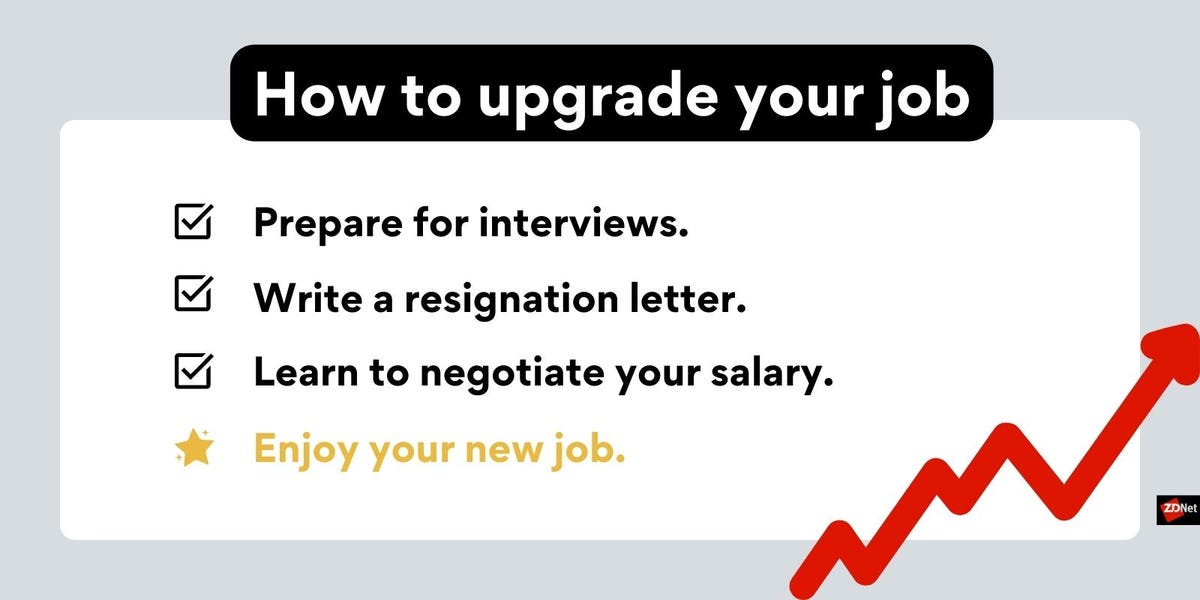Upgrade your job: 5 ways to get that career boost | ZDNet
If you have a tech job — or want one — the market is strong. And as a job-seeker or potential job-switcher, you have an advantage. The pandemic made remote work mainstream. It also accelerated a shift in power for people with technology skills and experience.
Right now, many workers can choose if they want to work in person, on a hybrid schedule, or 100% virtually. When you come to the table with additional skills or certifications, it enhances your opportunities to pursue jobs that fit your expectations and experience.
Whether you’re just starting your professional journey, in the middle of your career, or switching careers, we’ve got advice for you. Keep reading to learn more about certifications and skills that may help you upgrade your tech-focused career.
Spoiler alert: While certifications and upskilling help, so do soft skills and general tech professionalization.
CompTIA A+ certification
Every organization needs information technology security and support. As ZDNet’s Charlie Osborne recently noted, it seems that not a week goes by without news of a digital data breach. If you’re new to the tech industry or a career switcher who is interested in an entry-level help desk, system support, or systems administrator position, the CompTIA A+ certification may benefit you. This certification demonstrates your proficiency and knowledge of these key IT skills:
- Identify and connect hardware components that can support a remote workforce
- Spot security vulnerabilities for network-connected devices
- Install, configure, and troubleshoot the most popular and frequently used operating systems, including Windows, Mac, Chrome, Android, and Linux
- Configure laptops, mobile devices, and applications for end-users
SEE: The best tech certifications for every IT professional
AWS Certified DevOps Engineer — Professional
Companies in every business sector rely on Amazon Web Services (AWS) for cloud computing. Among them are Airbnb, Coursera, Johnson & Johnson, Samsung, and Unilever. If you’ve got at least two years of experience operating and managing AWS infrastructure and apps, consider earning the AWS Certified DevOps Engineer — Professional certification.
This certification demonstrates that you know how to automate testing and deployment of AWS-based infrastructure and applications. AWS also offers a variety of other related certifications that might advance your career.
Artificial Intelligence Engineer certification
According to the Artificial Intelligence Board of America (ARTIBA), the Artificial Intelligence Engineer certification is considered industry-standard for people who want to work in AI.
That’s because AI technology has value in every industry. Educators and employers alike recognize the value of AI. Several companies and colleges are supporting initiatives to expand AI education. ARTIBA offers three certification tracks for people with associate’s, bachelor’s, or master’s degrees. The certification demonstrates your knowledge of topics like machine learning, natural language processing, and cognitive computing.
SEE: How to become an AI engineer
Essential tech skills include soft skills, too
Education, experience, and job-related skills matter to hiring managers. But emotional intelligence, empathy, ethics, integrity, time management, communication, and teamwork matter too.
All of those attributes fall into the soft, or people, skills category. And they may help secure your next job opportunity. As job search site Indeed puts it, soft skills allow you to maximize the use of your hard skills. Check out these guides on soft skills and tech industry myths:
Key steps to level up your career
No matter how you approach shaping your career trajectory, making a few key decisions and moves may position you to step into your desired role. Once you’ve strengthened your hard skills and polished your soft skills, it’s time to take action.
If it’s been a while since you’ve changed jobs, check out these guides for reminders and insight about navigating key steps of the job changing process.

Tori Rubloff/ZDNet

Prepare for an interview
Whether you’re an internal job candidate or applying for a position with another company, experts say that you should prepare for your interview. Researching the company, the position, and even the interviewer’s background can also help you decide if the position matches your skills and career interests.
Check out this ZDNet guide if you want some interview prep insight: 41 impressive questions to ask in a job interview.
Learn to negotiate your salary
Sixty-three percent of workers who voluntarily left their jobs in 2021 said low pay was the reason.
The U.S. Bureau of Labor Statistics says the median annual salary for computer and IT occupations was $97,430 in May 2021. Negotiating your salary should be part of everyone’s job upgrade process, whether you’re staying with your current company or looking to join a new one.
Want insight on how? Check out our guide: How to negotiate your salary: A 5 W’s approach.
Write a professional resignation letter
According to a 2020 Gallup poll, 21% of millennials reported changing jobs in the last year. That’s more than three times the number of job-changers who weren’t born between 1980 and 1996. And in a 2021 report, the BLS said people born between 1957 and 1964 — younger baby boomers — said they held about 12 jobs between ages 18 and 54.
Nearly everyone changes jobs or careers throughout their lifetime. That means you’ll need to write a few resignation letters.
If you need some guidance, check out this guide: Do’s and don’ts for writing a resignation letter. It may help you avoid burning bridges or going viral for the wrong reasons.
For all the latest Technology News Click Here
For the latest news and updates, follow us on Google News.
